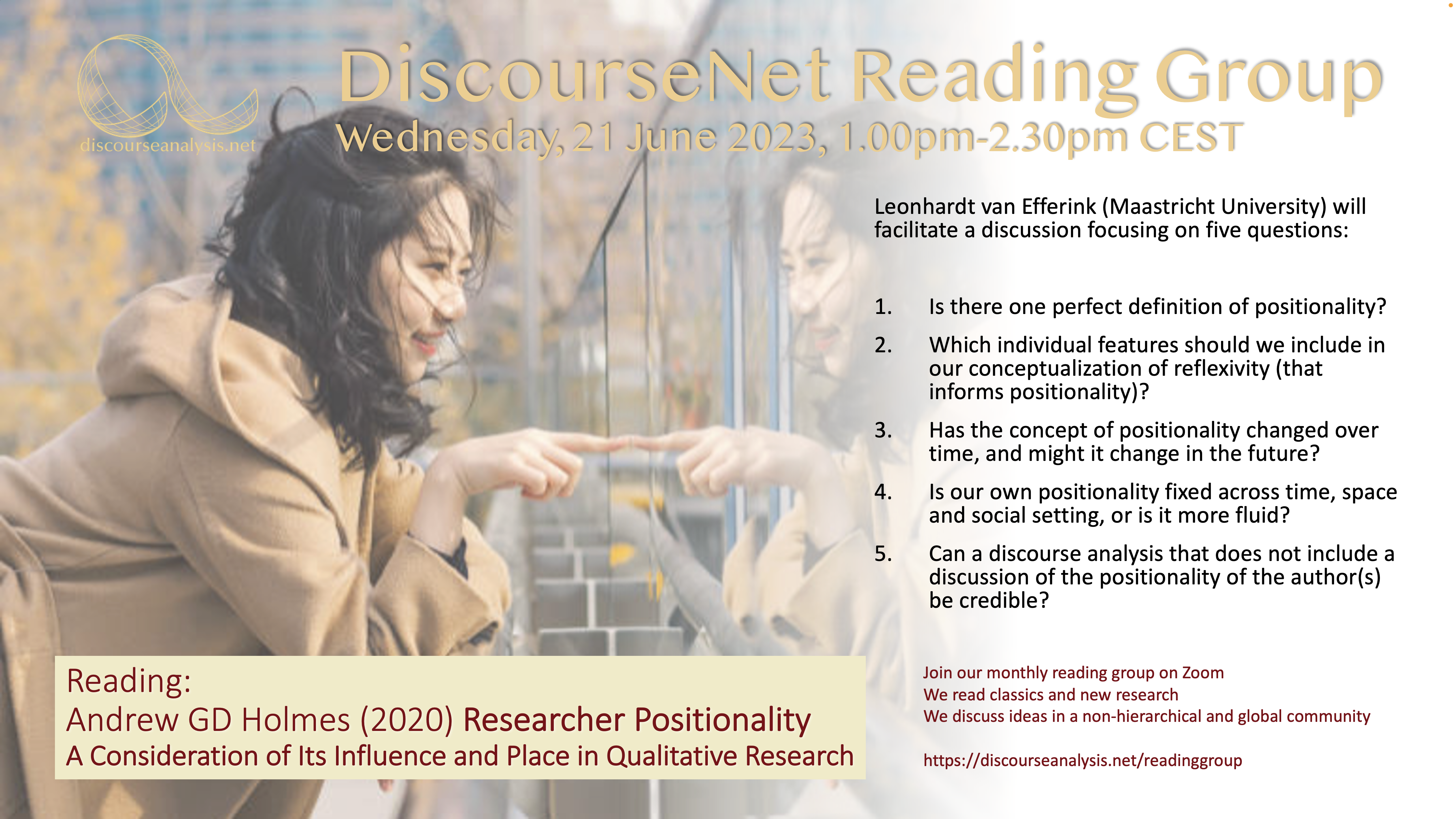DiscourseNet Reading Group

We e-meet every month for 90 minutes on Zoom to discuss a pre-selected reading. If you are interested in joining in, just sign up to this group and you will receive further information on dates and readings, as well as the meeting invite.
Our next meeting:
At our next session on Wednesday, 21 June 2023, 13-14.30 CEST, we will reflect on researcher positionality.
DN member Leonhardt van Efferink and Jaspal Singh will moderate a discussion on. It will be based on the article "Researcher Positionality - A Consideration of Its Influence and Place in Qualitative Research - A New Researcher Guide" by Andrew Holmes.
The discussion will focus on five questions (but other questions are of course welcome as well):
(1) Is there one perfect definition of positionality?
(2) Which individual features should we include in our conceptualization of reflexivity (that informs positionality)?
(3) Has the concept of positionality changed over time, and might it change in the future?
(4) Is our own positionality fixed across time, space and social setting, or is it more fluid?
(5) Can a discourse analysis that does not include a discussion of the positionality of the author(s) be credible?
We mainly use some form of English in this group.
If you have some questions, or if you would like to introduce suggest a reading for the next months, please send Jaspal a message at jaspal.singh@open.ac.uk.
We are looking forward to seeing many of you on 21 June 2023!
Best wishes
Jaspal, Kaushalya, Jan, Jens and Luciana
Past sessions:
Thank you all for participating in our previous meetings, in which we read:
Michel Foucault's Lecture 3 (from 25 January 1978) on Security, Territory, Population.
Gayatri Chakravorty Spivak (1988) Can the subaltern speak?
Norman Fairclough (2003) 'Political correctness': The politics of culture and language.
Sara Ahmed (2012) Whiteness and the general will: Diversity work as willful work.
Jan Blommaert (2013) Ethnography, Superdiversity and Linguistic Landscapes: Chronicles of Complexity.
Donna Haraway (1985) A Cyborg Manifesto: Science, Technology and Socialist-Feminsim in the Late Twentieth Century.
Rogers Brubaker and Frederick Cooper (2000) Beyond "identity".
Hannah Arendt (1969) On Violence.
Ernesto Laclau and Chantal Mouffe (1985) Hegemony & Socialist Strategy: Towards a Radical Democratic Politics.
Kwame Krumah (1968) Handbook of Revolutionary Warfare: A Guide to the Armed Phase of the African Revolution.
Gloria Anzaldúa (1987) Borderlands/La Frontera: The New Mestiza.
Valentin N. Vološinov (1973) Marxism and the Philosophy of Language.
Giorgio Agamben (2006) What is an Apparatus?
Tommaso M. Milani, Muzna Awayed-Bishara, Roey J. Gafter and Erez Levon (2020) When the checkpoint becomes a counterpoint: Stasis as queer dissent.
Charles W. Mills (2018) Black Radical Kantianism.
Madina Tlostanova (2020) Of birds and trees: Rethinking decoloniality through unsettlement as a pluriversal human condition.
bell hooks (1989) Talking Back: Thinking Feminist, Thinking Black.
Ngai-Ling Sum (2018) Towards a cultural political economy: Staging an encounter between Marx, Gramsci and Foucault.
Eve Tuck and K. Wayne Yang (2012) Decolonization is not a metaphor.
Michael Hardt and Antonio Negri (2004) Multitude: War and Democracy in the Age of Empire.
DiscourseNet Collaborative Working Papers Series, Special Issue on Discourses of War.
Achille Mbembé (2003) Necropolitics.
If you haven't done so already, please consider becoming a member of the DiscourseNet Association to support our various activities. More information can be found here: https://discourseanalysis.net/DN/members